8,000 Croats Have Registered for Vaccination via cijepise.zdravlje.hr so far
ZAGREB, 1 March, 2021 - Health Minister Vili Beroš said on Monday that the system for registration for vaccination against COVID-19 had been activated at cijepise.zdravlje.hr, and that so far 8,000 people had registered.
"The number of registrations bears witness to the level of awareness among our citizens. Anyone interested in getting vaccinated can apply at cijepise.zdravlje.hr, by dialling 0800 0011, contacting their family doctor or contacting the call centres of county public health institutes," Beroš said in a Facebook post.
"By activating the system, Croatia has become one of the leading countries that use central national platforms for vaccination. I believe we will ensure a successful start of the next round of priority vaccinations, for which we have ensured 240 vaccination stations," he said at a news conference of the national COVID-19 response team.
After registering for vaccination, a person will obtain information on the place and date of vaccination, which will depend on the amount of the vaccine to arrive. Multiple registration will not be possible and the platform will contain information on citizens' vaccination status, Beroš said.
Ministry officials have explained that any Croatian national or person with permanent or temporary residence will be able to register for vaccination.
People with chronic diseases are advised to first register with their family doctors, who will check their condition and determine their place on the vaccination list.
Bedridden persons and persons having difficulty moving should also register for vaccination with their family doctors, who will organise vaccination at their patient's home.
People aged 65 and over will have priority.
Vaccination will be conducted in family doctors' offices, county institutes for public health and mass vaccination stations. Depending on the available quantities of vaccine, the vaccination system will be changed and adjusted to the needs of citizens and medical workers.
More than 742,000 vaccine doses by end of March
A total of 315,870 doses of the vaccine - 179,000 doses of the Pfizer vaccine, 103,200 doses of the AstraZeneca vaccine and 33,600 doses of the Moderna vaccine - arrived in the country by the end of February.
By the end of March, Croatia expects another 426,657 doses of all three vaccines, rising the amount to 742,527 doses.
Croatia has pre-ordered 6.8 million doses of various vaccines against COVID-19.
By 25 February, 205,393 vaccine doses were spent and 146,565 people were vaccinated. The vaccination process is over for 58,828 people. The HALMED regulator by 25 February received 1,074 reports of suspected side effects, of which 868 referred to the Pfizer vaccine, 65 to the Moderna vaccine and 139 to the AstraZeneca vaccine.
For the latest news on COVID-19 in Croatia, follow the dedicated TCN section.
Istria Enters Epidemiological "Green Zone"
ZAGREB, 1 March 2021, 2021 - Istria has joined the epidemiological "green zone" today after recording a coronavirus incidence rate of 24 cases per 100,000 people over the last 14 days, the director of the Istria County Public Health Institute, Aleksandar Stojanović, told Hina on Monday, citing the latest EU data.
Stojanović said that Istria had seen a considerable fall in the infection incidence rate in recent weeks and a stagnation in the last two weeks, which calls for caution. He noted that Istria County was the last to reopen all schools because the education sector generated mobility and a large number of contacts.
About 8,700 people vaccinated, 2,600 with two doses
Stojanović said that about 8,700 people in Istria had been vaccinated against COVID-19, including 2,600 with two doses. He said that the vaccination was well coordinated and carried out at nine vaccination points across the county.
"We, of course, would be more pleased if we had more vaccine because the public interest is much greater than the number of vaccine doses available," Stojanović said.
The head of the county COVID-19 response team, Dino Kozlevac, said Istria continued to see a positive trend, but expressed concern about the situation in surrounding areas. He mentioned infection cases among staff at the Pula General Hospital, in schools and other sectors, as a result of which many people were in self-isolation.
Kozlevac warned that people had relaxed, increasing their contacts and ignoring the symptoms of the disease. "We are monitoring the relaxation of measures and will see its impact. We are mostly concerned about the situation in surrounding areas, which is not good at all."
For the latest news on coronavirus in Croatia, follow the dedicated TCN section.
Over €60 Million to Improve Dubrovnik's Water Supply and Treatment System
ZAGREB, 1 March, 2021 - The European Commission on Monday approved an investment of more than €60 million from the Cohesion Fund to upgrade the water supply and wastewater collection and treatment infrastructures in and around Dubrovnik.
"This project will not only provide inhabitants with the essential access to clean water and reduced water losses but it will also boost the commercial and touristic attractiveness of the area, thus improving the local socio-economic development," said Commissioner for Cohesion and Reforms Elisa Ferreira.
The Dubrovnik Agglomeration project covers the reconstruction of the existing water supply and wastewater collection systems and the construction of new sections, which will result in 98% water supply coverage and 92% wastewater collection coverage.
The project envisages the upgrading of more than 40 kilometres of water supply infrastructure and 31 kilometres of public wastewater collection infrastructure, the construction of new pump stations, water reservoirs and other necessary facilities as well as of a new wastewater treatment plant.
A drinking water treatment plant has already been built and the cost of its construction will be refinanced via the agglomeration project.
PM Plenkovic says Bandic Worked Hard to Make Zagreb a Better City
ZAGREB, 1 March, 2021 - Prime Minister Andrej Plenković on Monday signed a condolence book which was opened in City Hall after the death of Zagreb Mayor Milan Bandić on Sunday, and on that occasion he said that Bandić had worked hard to make Zagreb a better city.
Asked by the press outside City Hall if Bandić, who ran the city for 20 years, would be remembered as a negative or positive politician, Plenković said it was evident how much he had tried to do good things for Zagreb.
There are good and less good things about anyone involved in politics, Plenković said, adding, "Time will tell."
During his 20-year-long mayoral term, Bandić contributed to the development of the city and to the implementation of many projects, he demonstrated huge energy and enthusiasm, and what is crucial - he worked for Zagreb every day, the premier said.
Plenković thanked the late mayor for the positive things he did for residents of Zagreb and their city as well as for other parts of Croatia.
Plenković wrote in the condolence book that the residents of Zagreb had elected Bandić six times to the post of mayor.
In the last five years, as Prime Minister, I cooperated with the mayor and we supported the development of the Croatian capital. "As a politician and man, Mayor Bandić was distinctive for his inexhaustible working energy and enthusiasm," Plenković wrote.
For more on the death of Milan Bandic, click here.
Croatian Digital Nomad Online Application Form Launched
March 1, 2021 - An important milestone as the Croatia digital nomad online application form is launched in English and Croatia by the Ministry of Interior.
The next phase of the digital nomad story in Croatia is complete, as the Croatian digital nomad online application form has been added to the official website of the Ministry of the Interior.
Visitors to Croatia last year will be very familiar with the website, as it was also the place where the hugely successful Enter Croatia form was hosted, which helped speed up border crossing times considerably.
As with the Enter Croatia form, there are bound to be some initial teething problems, which will hopefully be quickly ironed out as they were with Enter Croatia back in May.
The launch of the online application option is the latest in a very swift (at least by Croatian standards) introduction of the digital nomad visa for Croatia.
It was only on July 11 last year that Dutch entrepreneur Jan de Jong wrote an open letter to Prime Minister Andrej Plenkovic requesting that Croatia introduce the visa. On August 25, following a meeting with de Jong, Plenkovic tweeted his decision to introduce the visa, and proposed changes in legistlation were put before Parliament the very next day.
Changes to the tax code and the Aliens Act at the end of last year provided the legal conditions for digital nomads to regulate their stay for a 12-month period, provided the appropriate conditions were met.
An American in Istria became the first digital nomad to successfully apply in late January - you can read her first interview here: Meet Melissa Paul, Owner of Croatia's First Digital Nomad Visa.
We will bring you more on the process shortly, but for now you can check out the Croatian digital nomad online application form here.
For the updated requirements to apply, check out Croatia Publishes Updated Digital Nomad Visa Requirements.
For the latest on the digital nomad scene in Croatia, follow the dedicated TCN section.
And for a taste of digital nomad life in Croatia, watch how this couple from San Francisco is adapting to winter life on Hvar.
Goran Tomić Named New Coach of Rijeka!
March 1, 2021 - Goran Tomić has been named the new coach of Rijeka!
The former Lokomotiva coach arrives at Rujevica after Simon Rožman left the club on Saturday. Recall, Rijeka suffered a 0:1 defeat to Hajduk in the 23rd round of the HNL on Saturday.
Goran Tomić came to Rujevica on Sunday. The Šibenik native, who did a top job with Lokomotiva last season, finishing 2nd in the HNL with a spot in the Champions League, recently lost his engagement in China, and ideally fits into the "long-term solution" Rijeka is after. In the Cup final last summer, Tomić lost with Lokomotiva against Rijeka and Rožman in Šibenik.
Tomić left Lokomotiva in early January to succeed Giovanni van Bronckhorst on the bench of Chinese Premier League Guangzhou City. His visa to China was denied after he contracted COVID-19.
Rijeka was taken over by Slovenian expert Simon Rožman in September 2019, when he succeeded Igor Bišćan, who went to the U-21 national team. In the first season on the Rijeka bench, Rožman won the Cup, beating Lokomotiva 1:0 in the final, and won third place in the Croatian championship. Only 12 days ago, he signed to extend his contract with Rijeka.
"Goran Tomić is the new coach of the Croatian Football Club Rijeka. Tomic signed a contract for a year and a half with the possibility to extend for another year. Goran, welcome," announced Rijeka on its Twitter page.
HNK Rijeka presented Goran Tomić at a press conference at 2 pm.
"I was given a great honor and opportunity to lead one of the largest Croatian clubs. I want to be the coach of a great club and fight for trophies and the highest goals and I thank you for the trust and honor that was shown to me," said Tomić.
"As soon as Rijeka's call came, I didn't hesitate for a second. I come full of energy and confidence in the desire to turn the situation around for the better. I will do everything in cooperation with the headquarters to achieve the goals of Rijeka. There is quality in the team and I will do everything possible in a short period of time to be ready," he added.
Sports director Ivan Mance also wished the new coach all the best.
"At the beginning, we want to thank Simon Rožman for his cooperation, the results show how good he was. He achieved great success, won the Croatian Cup, and achieved placement in the Europa League group stage. I am happy that our first and only candidate for coach has become the coach of Rijeka. Goran, I wish you all the luck in the world and a lot of success."
To read more about sport in Croatia, follow TCN's dedicated page.
PHOTOS: Cafe Terraces Reopen in Split After Three Months
March 1, 2021 - Cafe terraces reopen in Split after three (very long) months! A look at the cafe scene in sunny Split today.
March is off to a fabulous start as cafe terraces around Croatia reopen for the first time in three months.
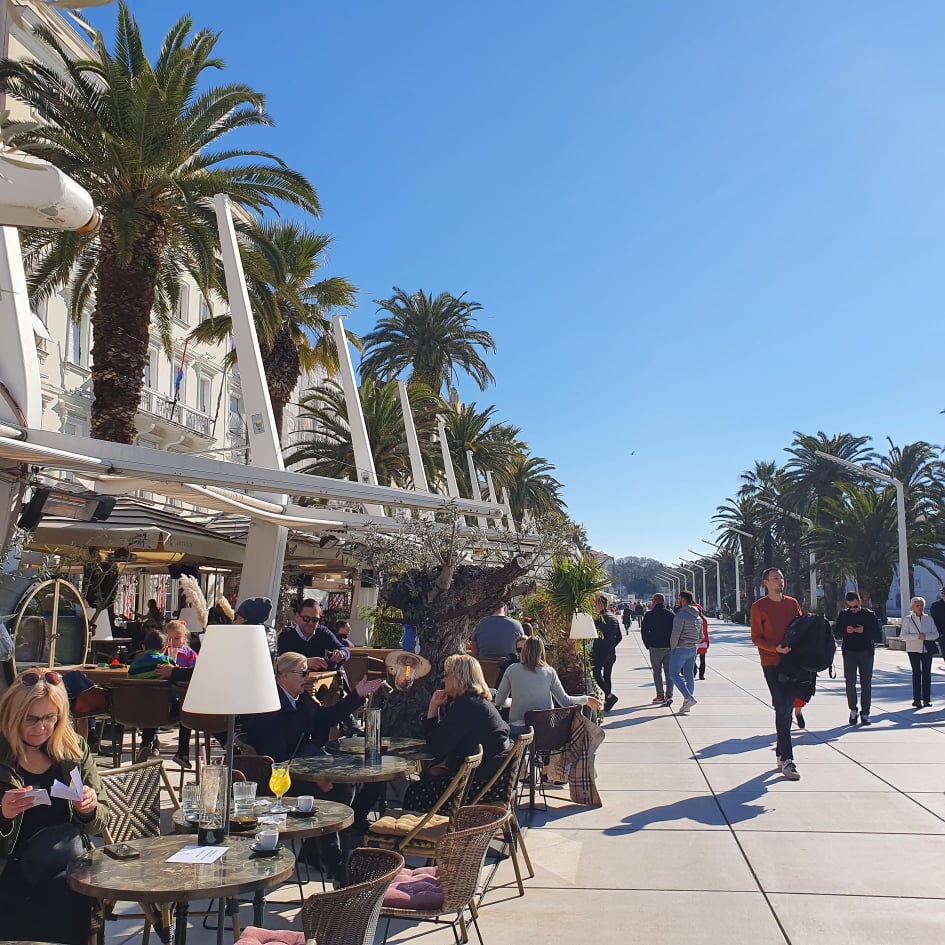
Recall, the National Civil Protection Headquarters announced last week that cafe terraces would reopen, but still under some strict guidelines. Namely, catering facilities can operate from 6 am to 10 pm, but only in open areas of the facility, while respecting the distance between guests of a minimum of three meters between tables and 1.5 meters between chairs. Terraces with plexiglass must be opened to allow airflow.
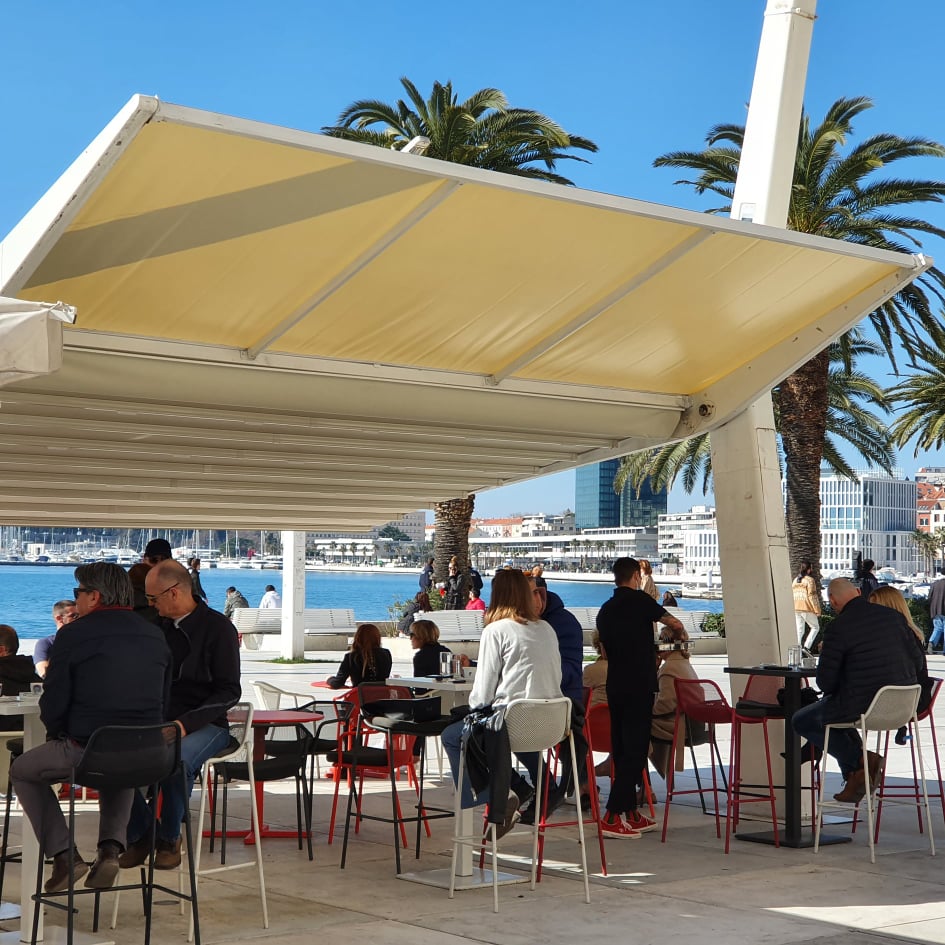
Hand disinfectant should also be available at the entrance, and masks are required when going to the toilet indoors, which must be clearly stated.
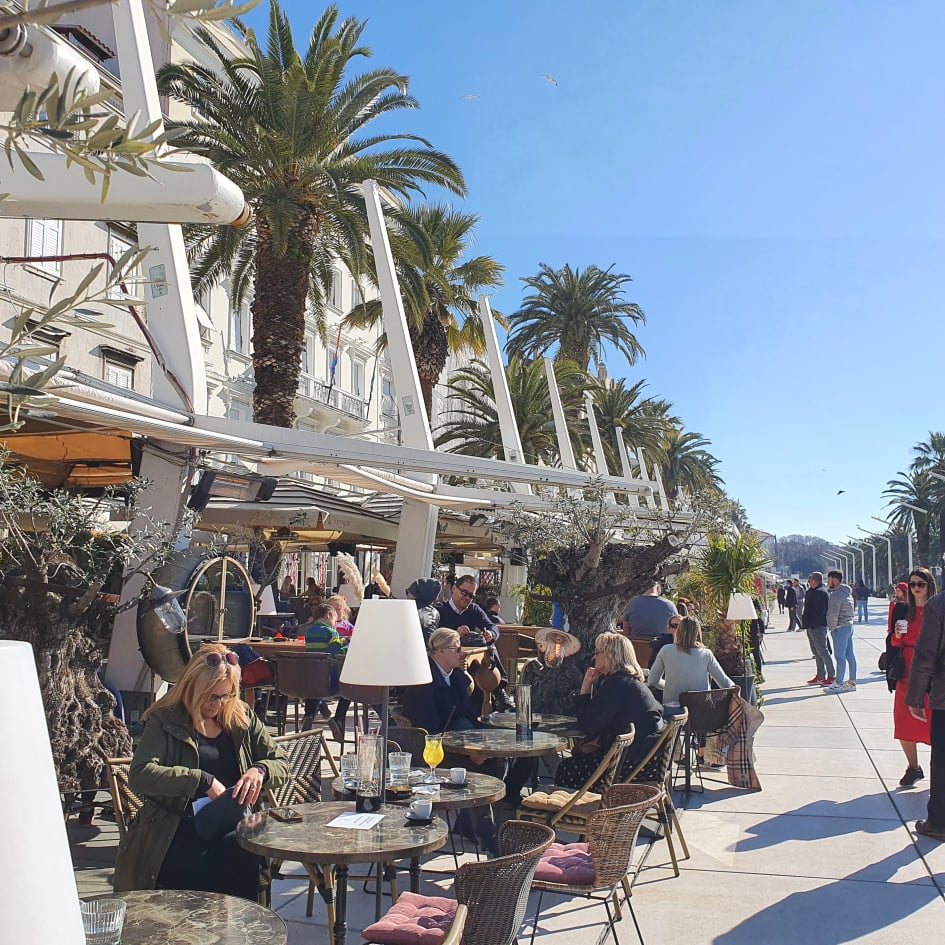
Music was originally banned, but the associations of musicians and caterers reached an agreement with the Headquarters, so music is also allowed, provided it is not too loud.
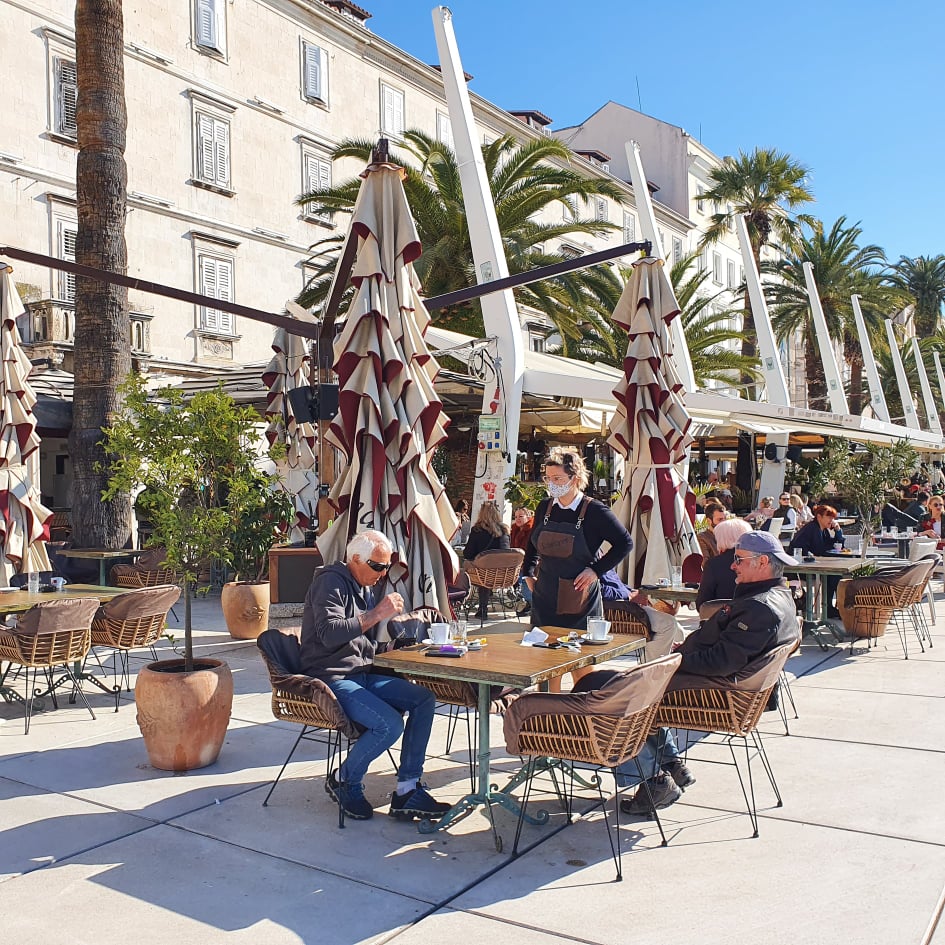
On a sunny morning in Split, with temperatures already reaching 14 degrees Celsius by 10 am, eager citizens flocked to cafe terraces around the city, and especially to the beloved Riva, where they had to fight for benches or enjoy hot drinks propped up against walls until now.
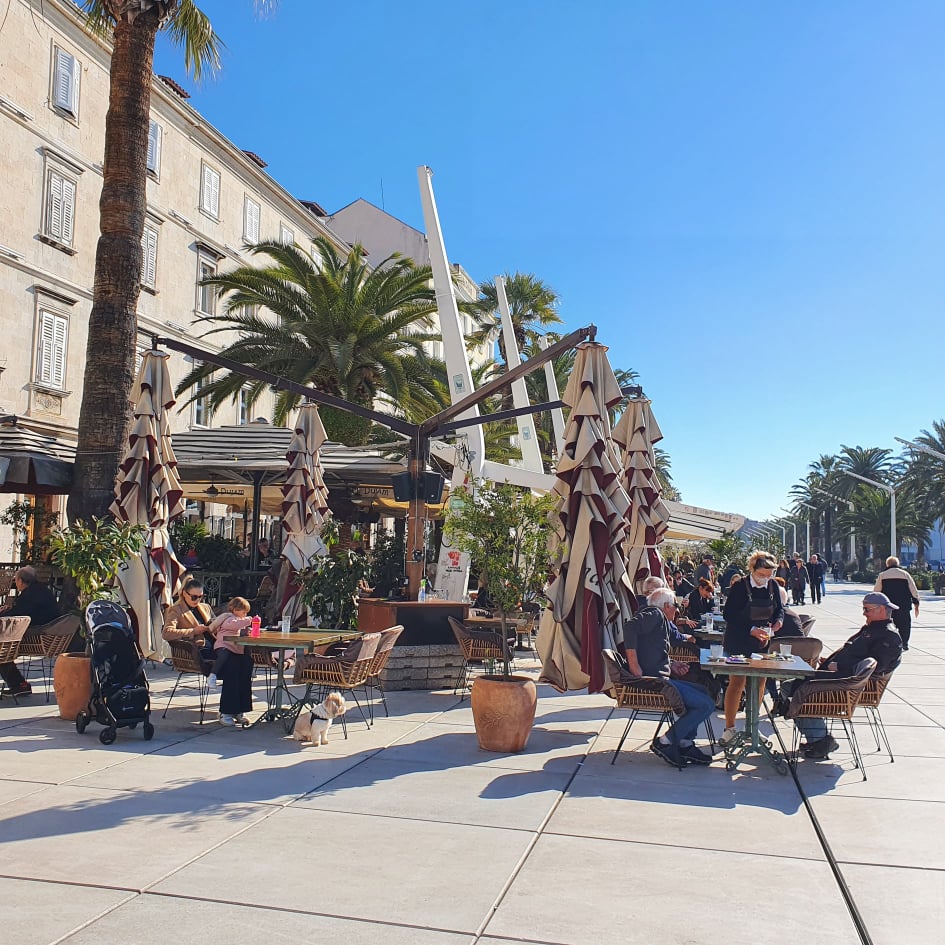
Waiters expect the biggest buzz around noon, though many early birds could hardly wait to reinstate their morning ritual - coffee, newspaper, and good company.
In the past 24 hours, 91 new coronavirus infections and 11 related deaths have been registered in Croatia, the national COVID-19 response team said on Monday.
There are currently 2,892 active cases, including 791 hospitalized patients, 64 of whom are on ventilators.
Since 25 February 2020, when the first case was registered in Croatia, 243,064 cases have been registered, including 5,537 deaths.
A total of 234,635 patients have recovered, including 401 in the past 24 hours.
Currently, 14,074 people are self-isolating.
To date, 1,346,946 people have been tested for the virus, including 2,294 in the past 24 hours.
Photos by Mirela Rus
To read more about lifestyle in Croatia, follow TCN's dedicated page.
Croatia Reports 91 New COVID-19 Cases, 11 Fatalities
ZAGREB, 1 March, 2021 - In the past 24 hours 91 new coronavirus infections and 11 related deaths have been registered in Croatia, the national COVID-19 response team said on Monday.
There are currently 2,892 active cases, including 791 hospitalised patients, 64 of whom are on ventilators.
Since 25 February 2020, when the first case was registered in Croatia, 243,064 cases of infection have been registered, including 5,537 deaths.
A total of 234,635 patients have recovered, including 401 in the past 24 hours.
Currently 14,074 people are self-isolating.
To date 1,346,946 people have been tested for the virus, including 2,294 in the past 24 hours.
For the latest news on coronavirus in Croatia, follow the dedicated TCN section.
Zagreb Airport Rated Best in Europe in 2020 for 3rd Consecutive Year
March 1, 2021 – In the category of two to five million passengers a year, Zagreb Airport rated best in Europe in 2020, according to the passenger satisfaction survey.
As Zagreb International Airport reports, despite challenging times reflected in a significant reduction in passenger numbers and air operations, passengers and users of Franjo Tuđman Airport services awarded the airport with high marks for the third consecutive year. Through a regular survey of the quality of ACI/ASQ (Airports Council International/Airport Service Quality) services, Zagreb Airport was named the best airport in Europe in the group of airports of two to five million passengers per year (Best Airport in Europe by Size and Region) in 2020.
'Significant efforts in these demanding circumstances have been recognized'
This recognition comes from a survey of the airport services quality conducted in 2020, which will remain recorded as the most difficult and demanding year in the history of aviation. This year was also challenging for Zagreb Airport due to the earthquakes in Zagreb and Banovina. Zagreb Airport says that they are incredibly proud of this recognition.
"We can rightly consider that this recognition for 2020 has an added value that is reflected in the special and increased responsibility towards the work obligations of all workers and service providers at the airport in new and unexpected circumstances," Zagreb Airport points out.
ACI announced the winners of the ASQ Awards today at its headquarters in Montreal, Canada. The awards are given for contributions to the promotion and enhancement of the user experience of airport services. The ACI/ASQ program recognizes airports around the world that, according to passengers' opinion, provide the best airport services and travel experience.
In addition to being named the best airport in Europe for two to five million passengers for the third consecutive year (2018, 2019, and 2020), shortly after its opening in 2017, Zagreb Airport also received recognition for the greatest improvement in Europe. Thus, Franjo Tuđman Airport has been awarded for the fourth consecutive year.
"We are delighted that our significant efforts to ensure the best possible service in these demanding circumstances have been recognized, primarily taking into account the protection of health and safety of our passengers, workers, and business partners," said Zagreb International Airport Management Board president Huseyin Bahadir Bedi.
He also announces the imminent start of the summer flight schedule and hopes for a gradual recovery in traffic and the resumption of normal business activities.
The categorization of airports by passenger numbers has not changed despite fewer passengers
The Airport Service Quality (ASQ) is the world's leading program for assessing the level of passenger satisfaction with airport services.
The field program is conducted throughout the year by certified ASQ agents, interviewing passengers at airports through a single ACI/ASQ questionnaire. Slightly fewer passengers were surveyed in the second quarter of 2020, while in the first, third and, fourth quarters, the same number of passengers was surveyed as in 2019.
ACI (Airport Council International) has not changed the categorization of airports by the number of passengers, even though in all airports in 2020, there was a significant reduction in passengers' number due to the coronavirus pandemic.
To further improve business at Zagreb Airport, this program will provide additional insight into implementing pandemic protection measures during 2021.
For the latest travel info, bookmark our main travel info article, which is updated daily.
Read the Croatian Travel Update in your language - now available in 24 languages.
Andreja Ambriovic Ristov: If Numbers Rise, We'll Seek Stronger Measures
March the 1st, 2021 - Molecular biologist and member of the Government Scientific Council, Andreja Ambriovic Ristov, has stated that if coronavirus infection numbers begin to rise again with the loosening of the country's epidemiological measures, then unfortunately harsher measures will need to be sought.
As Poslovni Dnevnik writes, molecular biologist and member of the Croatian Government's Scientific Council, Andreja Ambriovic Ristov, told HRT on Monday that we shouldn't be surprised that the South African strain of the novel coronavirus, which is already present in many European countries, has now arrived in Croatia. Luckily, as she says, the infected tourists didn't pass the disease on to anyone else.
Andreja Ambriovic Ristov has said she expects Croatia to receive more doses of the vaccine and she hopes the country will manage to achieve a vaccination rate of at least 50 percent.
''Vaccination of the population depends on the spread of these variants, for variants that spread faster, we'll need more vaccination. Perhaps the data on 70 percent of the population needing to be vaccinated, which would be enough for collective immunity, will have to be revised. The fight against these new variants is to keep the epidemic under control and reduce the number of circulating variants in the population,'' explained Andreja Ambriovic Ristov.
"We need to continue to monitor all these variants, by sequencing or introducing a customised PCR method that will look for these variants, the South African one, and for the British variant we already know that it is present in our population, at a level of about 20 percent. As we know that this variant is spreading faster, we expect that it will compete with the old strain and overtake it,'' she added.
What we currently know is that the British variant of the novel coronavirus spreads more rapidly, but the symptoms are the same as for the previous variants. We know that the South African strain is spreading faster, but we don't know how much. For the South African strain, we don't have sufficient data on whether it causes a more severe form of the disease or not.
“When it comes to populations where there are two fast-spreading variants circulating, it will be interesting to see which one will win. People can in no way detect if it is a variant, the symptoms are the same. This virus causes different symptoms in people of different ages, from people being asymptomatic carriers to people who are younger ending up with severe symptoms,'' said Andreja Ambriovic Ristov.
She stressed that all of the current vaccines against the virus work well because they protect against severe forms of the disease.
She pointed out that it is not at all true that overcoming the disease protects better than vaccines. ''Immunity gained from a vaccine is better than overcoming the disease precisely because the symptoms are different, so it is recommended that people who have caught coronavirus and recovered still go and be vaccinated. It's clear that SARS-CoV-2 is not a seasonal virus and that it is present throughout the year,'' Ristov said.
Asked why there is an increase in the number of patients in the countries where it is now summer, Andreja Ambriovic Ristov explained: ''It all depends on the epidemiological measures, the number of people around and the number of circulating viruses. If one variant is more contagious than another, then even with existing epidemiological measures, the epidemic flares up. There's no need to panic about new variants, they are constantly being created through mutations. We expect new variants and that's why we're constantly monitoring them. The way to fight these new variants is with epidemiological measures that reduce the circulation of the virus.''
Speaking about the situation in Croatia, Andreja Ambriovic Ristov stated that the measures were delayed at the end of the year, which was reflected in the number of new cases of coronavirus. "If we see an increase in the number of infected people, and given which variant is in question, we'll certainly propose the introduction of stricter measures," she said.
Andreja Ambriovic Ristov recommended that citizens be vaccinated with AstraZeneca, adding that she expects that its effectiveness in the elderly will not be much lower than it is in the younger population.
''We're all amazed at what is happening with the low utilisation of the AstraZeneca vaccine. The professional literature states that it has an efficiency of 62 percent. Influenza vaccines are 40 to 60 percent effective and anyone who has been vaccinated has had far fewer symptoms and no one has died. I see absolutely no reason why vaccines with an efficiency of 62 percent are not considered as good as the Moderna or Pfizer vaccines," she told HRT.


